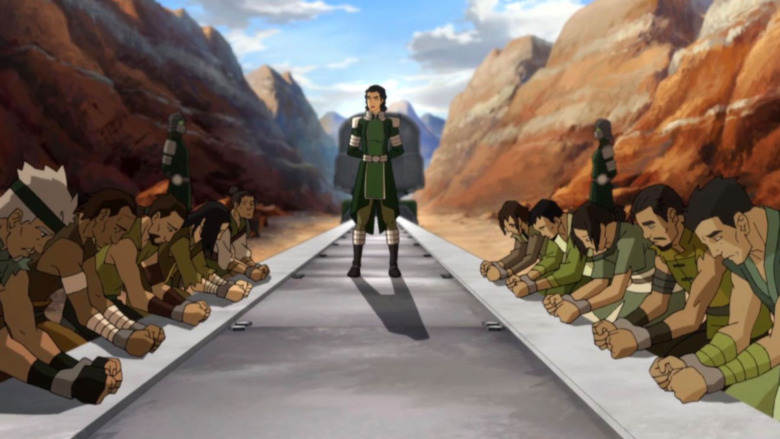The Disturbing Kuvira Detail The Legend Of Korra Fans Never Noticed
Any good story is going to be layered, and as a result the best stories often require multiple viewings or readings to fully grasp all the nuances. Sometimes, this depth isn't even intentional on the part of the creators; layered meanings are emergent properties of rich, thoughtful writing. Fans can debate whether certain creative choices were intentional, or a product of serious head canon, but in the end it doesn't really make a difference.
One great example of a surprisingly layered story is Avatar: The Legend of Korra, the worthy sequel to Avatar: The Last Airbender, the greatest animated show ever made. Set 70 years after the first TV series, Avatar: The Legend of Korra follows Korra (voiced by Janet Varney), the newest Avatar, whose task of keeping peace in the world is complicated in season 4 by the rise of a fascistic metalbender named Kuvira (Zelda Williams).
Kuvira starts off as a humble soldier in the semi-autonomous Earth Kingdom city-state of Zaofu. She rises to become the leader of the war-torn Earth Kingdom after she helps stabilize the country. Soon after her rise to power, however, Kuvira's real intentions become clear: She hopes to "unify" the entire world under one authoritarian government. If you're starting to sense the Hitlerian overtones here, you're not alone.
As Redditor u/SuperCookieGaming pointed out, one of Kuvira's disturbing tactics resembles a similar technique employed by history's most notorious villain.
How Kuvira took a page from you-know-who's playbook
One of the big challenges to Kuvira during her rise to power is uniting the Earth Kingdom and its factions. To do this, Kuvira doesn't simply overpower her rivals and force them to submit to their will; she actually requires them to swear an oath of allegiance. "Pledge your loyalty to me, and I'll give you a new purpose," she often says.
This is a standard move for any would-be dictator trying to establish a cult of personality. Even more troubling: The wording of Kuvira's loyalty pledge is disturbingly similar to the one used by Adolf Hitler, which was called the "Hitler Oath."
In August 1934, Hitler had already been elected Chancellor of Germany, but hadn't yet taken control of the entire government. The day before the death of President Hindenburg, Hitler's cabinet moved to consolidate the roles of Chancellor and President into a new role called the "Führer und Reichskanzler," or "Leader and Chancellor." This gave Hitler control of both the government and the military.
In order to secure the military's cooperation, two of Hitler's ministers drafted a loyalty pledge that both Wehrmacht officers and civil servants would have to recite. The Werhmacht version read: "I swear by God this sacred oath that to the Leader of the German empire and people, Adolf Hitler, supreme commander of the armed forces, I shall render unconditional obedience and that as a brave soldier I shall at all times be prepared to give my life for this oath."
Kuvira makes her own soldiers say pretty much the same thing, although their pledge is a little more concise. Maybe this was an intentional Nazi allusion on the part of Korra's creators; or maybe all fascist pledges just sound alike.

